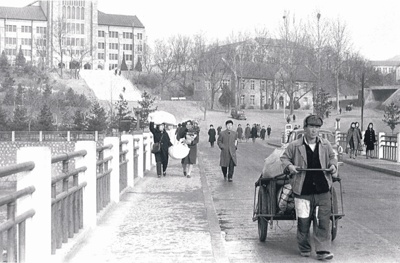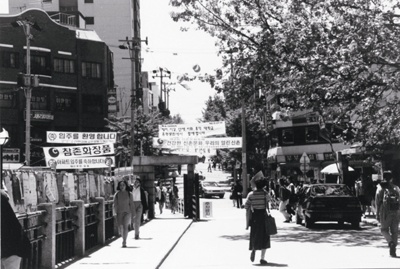Lore of Ewha Bridge and Babo Stage

Ewha Bridge has been there to witness Ewha’s changes for more than 40 years, and finally became one of those changes. Built in 1958, the bridge served many Ewha students not only as a walkway but also as a way that connected students and the society.
A railway ran under Ewha Bridge with trains passing underneath each day. Just like the myth that brings tourists to Ewha, Ewha students believed that if a person catches the train’s tail and stepped on it on the bridge, her love or wish will come true Many people tried to step on the train’s tail, but for Ewha students, stepping on it was a daily activity.
“I do remember that my friends and I would run to the bridge whenever we heard the sound of the train, trying to step on its tail, eventually stepping on each other’s feet and laughing gaily,” professor Cho Sang-mi (Social Welfare) said.
The Babo Stage, babo meaning stupid, was a place where boys usually stopped to wait Ewha students. No time of its establishment is recorded and the name, location and the place itself were unofficial. The only official fact about the stage is the memory it holds for alumnae, be they Ewha students or from elsewhere. Boys used various methods to express their affection for Ewha students on the stage.

“A friend had an admirer who came to the Babo Stage every day, and he did that for every single day of several months,” professor Lee Yun-sil (Pharmacy) said. “Her friends tried to convince her to meet the guy out of pity, but she never did. Some said she slapped him in the face for visiting Ewha too much and bothering her.”
Admiration did not only come from the boys of student age, but also from older men.
“There was a man we called Beethoven because of his hairstyle,” professor Chai Sang-mi (Business) said. “He had Beethoven’s hairstyle, was always wearing a suit and standing on the stage alone. A rumor says that he was always standing there because of the mental shock he received after an Ewha student dumped him.”
The fairytales of the Ewha Bridge and the horror stories of the Babo Stage did not continue into the 21st century. Nevertheless, their past stays with us as a part of Ewha, and it is now our mission to record new tales to be told to the future Ewha students.
* Reporters: Lee Min-jeong & Chung Che-yoon
* Emails: mjlee@ewhain.net, thfl353@ewhain.net

